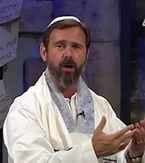Rabbi Schneider — Feast of Tabernacles
God bless you, and Shalom, beloved ones. My name's Rabbi Schneider. Welcome today to this special edition of Discovering the Jewish Jesus where we're gonna be talking about the Feast of Tabernacles. Now in Hebrew we call this feast Sukkot. The Feast of Booths is another name for it. Did you know that Jesus himself celebrated this feast?
We read about it in the Gospel of John, chapter 7. Let's begin by going to John, chapter 7, today. I'm just going to point out a few highlighted verses. So for those of you who are new to this, you'll be able to see that Jesus himself was really rejoicing during this special season of thanksgiving in which we celebrate the Feast of Tabernacles. I'm beginning in John, 7, verse 2.
Now the feast of the Jews, the Feast of Booths, was near.
Now booths is another name for tabernacles. In Hebrew we call a booth or a tabernacle a Sukkah. And so we call this, this feast once again in Judaism the Feast of Sukkot, rather than a Sukkah which is singular, we call it Sukkot which is plural for tabernacles or many booths because the Lord instructs native born Jews, native born Israelites to build a temporary structure, a tabernacle or a booth in the land of Israel during this time every year, even today, to remember how when they were in the wilderness for forty years, years ago, that they lived in these temporary booths or tabernacles. And so this is something that is still part of Jewish culture.
This was part of Jesus's culture, and there's much that you and I can learn from and take away from participating in celebrating this feast today. So once again, we're in John, chapter 7, now, and beloved one, I'm just beginning to build a foundation here so that you see how Jesus himself was celebrating this feast.
And the reason I like to do this is because many people, Christians, sincere Christians, they look at things Jewish and they might look at it with interest but they don't really feel it as relevance for them.
They kind of look at the Old Testament as written for another time and another people, the Jewish people, and they view it as having little application for their lives today. But one of my goals is to help you to understand the application that the Hebrew Bible does have for you today, that the Old Testament can be a blessing for you.
In fact, Paul said that the Old Testament was written, not just for the Jewish people, but for the entire church today upon whom the end of the ages has come. So once again, John, chapter 7, verse number 2:
Now the feast of the Jews, the Feast of Booths, was near
As we continue in John, chapter , we see that Jesus in the middle of the Feast of Tabernacles goes into the temple in Jerusalem and begins to teach. And so we read there in verse number 10
But when His brothers had gone up to the feast, then He Himself also went up.
And then in verse 14
But when it was now the midst of the feast, Jesus went into the temple and began to teach.
In fact, it was on the final day of the Feast of Tabernacles that Jesus was in the temple and he cried out these words as the priest in the temple, on Tabernacles, were doing a special ceremony
